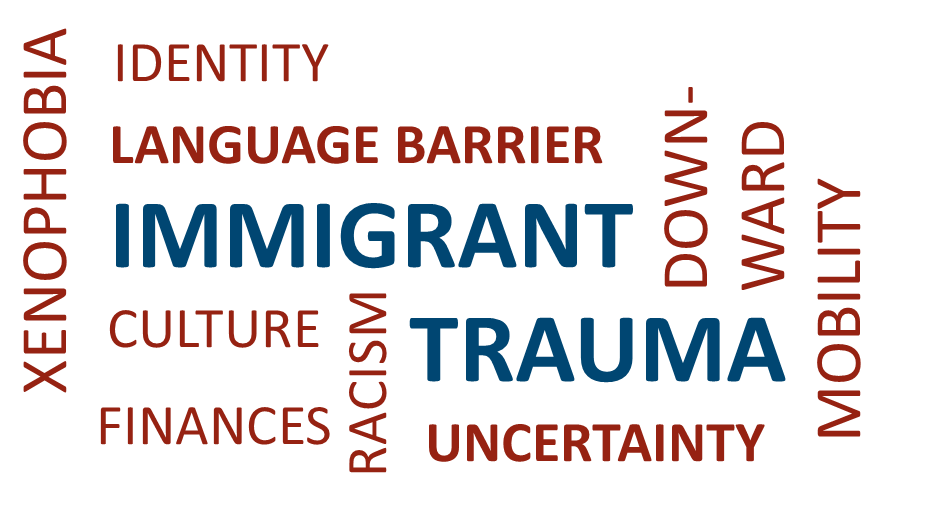
In order to understand immigrant trauma, it is necessary to understand acculturation. But what exactly is it? Clinical psychologist and director of the mental health counselling program at Boston College’s Lynch School of Education, Dr. Usha Tummala-Narra, describes psychological acculturation as “the dynamic process immigrants experience as they adapt to the new country.” For some immigrants, this process can be swift and easy, but for many immigrants acculturation can be extremely stressful. Factors that may contribute to this stress include language barriers, financial struggles, changing gender roles and downward social mobility in their adopted homeland.
For more curated, on-demand resources, including tools from our own webinars, explore our comprehensive, searchable Immigrant Trauma and Mental Health resources page.
Inter-generational Culture Clashes
Acculturative stress can be particularly difficult when the two cultures are in conflict. This is especially true for the 4.5 million citizen children who have undocumented parents. Dr. Tummala-Narra says that “first-generation immigrants may experience less psychological distress than second-generation immigrants.” American behavioral acculturation occurs rapidly for children, and Dr. Nakamura writes that “parents may feel that their children are becoming too American too fast, and children may feel their parents don’t understand them.”Child and parent may have different expectations for the child’s autonomy and supervision, and children may view their parents as an obstacle in achieving their goals. While acculturation to American culture is “successful” in these cases, this success and overacculturation can lead to new levels of stress and intergenerational disagreements when the two cultures are in conflict with one another.
Additional Stressors

Dr. Tummala-Narra has seen a rise in acculturative stress for her patients due to uncertainty surrounding immigration policy, and fear of deportation is noted as the presenting problem in many instances. In addition, some immigrants experience racism, xenophobia and anti-immigrant sentiment, and this discrimination can be a key cause of acculturative stress. It is therefore no wonder that immigrants of color experience higher levels of acculturative stress, or that many immigrants feel like they have to hide their ethnic identity.
When acculturative stress combined with prejudice strikes, immigrants are less likely to seek out mental health services, says Dr. Nadine Nakamura, of the University of La Verne in California. If they do seek out care, there are numerous barriers such as “difficulty finding transportation or child care and communication problems—not just language differences, but cultural nuances that a clinician might not recognize,” Dr. Nakamura writes.
Strategies to Mitigate Immigrant Anxiety, Fear and Trauma
This 37 minute presentation, “Strategies to Mitigate Immigrant Anxiety, Fear and Trauma,” was part of the 2018 webinar Tackling the Hidden Crisis: Immigration Anxiety and Trauma.
Heritage and Acculturation
 One solution to combat this stress is to ensure immigrants have consistent access to their “heritage” culture. While it is acculturation to the host culture that gives access to society and institutions for first-generation immigrants, it is the heritage culture that can provide access to cultural resources and support, as well as address trauma. For second-generation immigrants and citizen children, familiarity with one’s heritage culture and native language can ease familial conflict and improve grades and literacy.
One solution to combat this stress is to ensure immigrants have consistent access to their “heritage” culture. While it is acculturation to the host culture that gives access to society and institutions for first-generation immigrants, it is the heritage culture that can provide access to cultural resources and support, as well as address trauma. For second-generation immigrants and citizen children, familiarity with one’s heritage culture and native language can ease familial conflict and improve grades and literacy.
Ultimately, acculturative stress can be overcome if it is understood that ethnic identity, which includes heritage culture and racial identity, and national (i.e. American) identity are not mutually exclusive and can successfully coexist.
More Resources
, a recording of Dr. Usha Tummala-Narra’s presentation in our 2017 webinar One Year Later: Immigrant Trauma and How to Deal with It.
, Dr. Usha Tummala-Narra’s presentation from our 2016 webinar Student Success: Models and Tools for K-12 and Adult Educators.
, an academic paper by Tori DeAngelis, Dr. Nadine Nakamura, and Dr. Usha Tummala-Narra in American Psychologist 42.
